| Srl | Item |
| 1 |
ID:
115880
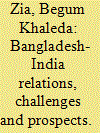

|
|
|
|
|
| Publication |
2012.
|
| Summary/Abstract |
The relations between Bangladesh and India are important and have a strong historic basis. The prospects for these relations to grow in strength are indeed enormous if they are pursued for mutual benefit and with mutual respect. Our geographical proximity, cultural affinity and shared history should form the parameters of our relations.
The challenges that confront policy makers, as well as the general public, are mostly due to negative legacies that may have their roots in our colonial past, where both our people were victims of the divide and rule policies of the Colonialists. This has created a sense of fear and distrust. There are forces in both of our societies who have played, and continue to play, on this fear psychosis to perpetuate mutual suspicion and thereby keep us apart. It is therefore imperative that we work together to lay a new foundation on which to build strong, broad-based, durable and cooperative ties, free from the thinking of the past, and generate greater trust amongst our people. In short, the need of the time is a changed mindset.
|
|
|
|
|
|
|
|
|
|
|
|
|
|
|
|
| 2 |
ID:
115885
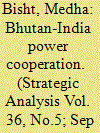

|
|
|
|
|
| Publication |
2012.
|
| Summary/Abstract |
The article argues that as India and Bhutan have moved into the second phase of power cooperation, it is important that the two countries revisit their policies and identify approaches that will be sustainable in the long term. The article emphasises that a sub-regional energy grid between Bhutan, India and Bangladesh can become an effective conduit for strengthening sub-regional diplomacy and help in addressing the latent but underlying concerns of Bhutan, which have the potential to impact India-Bhutan bilateral relations in the long term.
|
|
|
|
|
|
|
|
|
|
|
|
|
|
|
|
| 3 |
ID:
115877
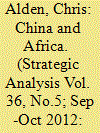

|
|
|
| 4 |
ID:
115886


|
|
|
|
|
| Publication |
2012.
|
| Summary/Abstract |
China's emergence as a global actor has fuelled much speculation over its 'intentions' in the long term. Arguably, debates on the issue have centred around China's growing military and economic power and concurrent challenges to the maintenance of the existing status quo in the international system. This article seeks to understand China's foreign policy motivations by studying the conceptualisation of 'national interest' within China. It examines Chinese literature for the definition of 'national interest', the current thinking on 'core interests' and what this implies for China's foreign policy trajectory. The article emphasises the domestic rationale that guides the conceptualisation of 'national interests and their pursuit' internationally.
|
|
|
|
|
|
|
|
|
|
|
|
|
|
|
|
| 5 |
ID:
115879
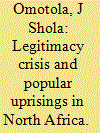

|
|
|
| 6 |
ID:
115878
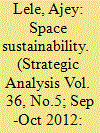

|
|
|
| 7 |
ID:
115881
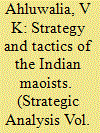

|
|
|
|
|
| Publication |
2012.
|
| Summary/Abstract |
Naxals of the Communist Party of India (CPI) (Maoist), better known as Maoists, characterised more than once by the Indian prime minister as the gravest threat to our internal security, have been continuously fine-tuning their strategies and tactics in order to maintain their relevance. On the other hand, the state too has been making concerted efforts by taking 'security and development' measures to diminish, if not altogether defeat, the challenge posed by the rebels to the Indian state.
|
|
|
|
|
|
|
|
|
|
|
|
|
|
|
|
| 8 |
ID:
115884


|
|
|
|
|
| Publication |
2012.
|
| Summary/Abstract |
The article is an attempt to study the history of the Tedim Road, a 265 km transborder road connecting Imphal (the capital of Manipur in India) with Tedim in the Chin Hills (Chin State) in western Burma (Myanmar). It was constructed by the British solely for the purpose of facilitating military movements along the India-Burma frontier during the Second World War. Although it is yet to receive adequate scholarly attention, the historical significance of the Tedim Road as part of the larger Allied plan for the reconquest of Burma after it was lost to the Japanese in the early 1940s cannot be overlooked. The article attempts to analyse encounters between the Allied and the Japanese on this road. It argues that the historical events that occurred on the Tedim Road and the participation of the indigenous tribes of the India-Burma frontier in the war made a significant contribution to ensuring the withdrawal of the Japanese from the Indian frontier.
|
|
|
|
|
|
|
|
|
|
|
|
|
|
|
|
| 9 |
ID:
115883


|
|
|
|
|
| Publication |
2012.
|
| Summary/Abstract |
The objective of this article is to critically analyse the discourse within the Unified Communist Party of Nepal (Maoist) or known as UCPN (Maoist) since its evolution and find out whether the Maoists have adapted themselves to the democratic process well by using democracy as a tool to achieve their own revolutionary political objectives. The article argues that the internal Maoist discourse reflects that there is no change in the UCPN (Maoist) strategy or political goals. They have only changed their tactics to suit the situation. The changes are also more visible at the organisational rather than the ideological level. Since the party is in transition, they may not opt for another round of violent revolution to achieve their political objectives; they will try their best to achieve them through peaceful means. Since the party has already experimented with the radicals' ideas in 2004-2005, the top leaders will be extra careful in the future about letting the radicals dominate the party.
|
|
|
|
|
|
|
|
|
|
|
|
|
|
|
|
| 10 |
ID:
115882


|
|
|
|
|
| Publication |
2012.
|
| Summary/Abstract |
The Indus Water Treaty (IWT) is the most significant confidence-building measure between India and Pakistan. Despite the wars and hostilities, the IWT has functioned well since it was signed in 1960. However, one cannot ignore the challenges of future supplies of fresh water between the two countries. The article delves into a historical account of how the treaty came about, the salient features of the treaty and examines whether 'water rationality' will continue to govern the riparian relationship or whether 'water sharing' will open up a new front of contentious politics. The article reasons that in spite of the enormous potential of sharing the benefits, it is unlikely that the two countries will agree to modify the IWT and convert it from a water portioning treaty into a water resource development treaty.
|
|
|
|
|
|
|
|
|
|
|
|
|
|
|
|